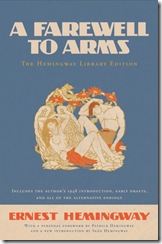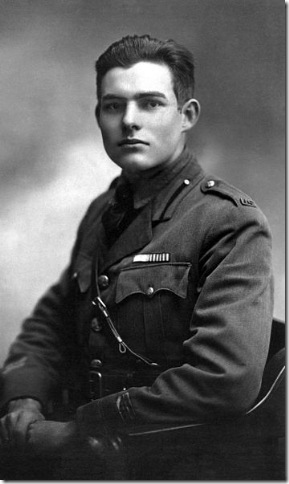Ernest Hemingway’s reputation as a master of 20th century American literature is based in part on A Farewell to Arms, his searing story of war and love, first published in 1929.
This new edition of the esteemed novel adds 40 pages of jottings and drafts, including dozens of alternative endings, which show how much Hemingway struggled to get it right.
Although the book is fiction, it was based on Hemingway’s own experience during World War I, when he served as an ambulance driver for the Italian army. He wrote Farewell while living in various places, including Key West, where The Ernest Hemingway Home & Museum remains a popular tourist destination.
Two decades after A Farewell to Arms was published, Hemingway penned an introduction in which he described the joy of creative writing, saying it gave him “a greater pleasure than any I had ever known.”
Hemingway detested war, as evidenced in the introduction, where he referred to the “constant, bullying, murderous, slovenly crime of war.” He blamed war on “economic rivalries” and the “swine that stand to profit from them.”
“I believe,” he wrote, “that all the people who stand to profit by a war and who help provoke it should be shot on the first day it starts. …”
 In spare prose and clipped dialogue, A Farewell to Arms tells the poignant story of Frederic Henry, an American ambulance driver who falls in love with Catherine Barkley, an English nurse, who then becomes pregnant with their child. During a trip to the front, Frederic is wounded. He and his comrades join a column of soldiers and civilians fleeing the fighting. In a harrowing scene, Henry is about to be shot as a deserter when he escapes by jumping into a river and later sneaking onto a freight train. He reunites with Catherine, and together they flee to Switzerland to await the birth of their child.
In spare prose and clipped dialogue, A Farewell to Arms tells the poignant story of Frederic Henry, an American ambulance driver who falls in love with Catherine Barkley, an English nurse, who then becomes pregnant with their child. During a trip to the front, Frederic is wounded. He and his comrades join a column of soldiers and civilians fleeing the fighting. In a harrowing scene, Henry is about to be shot as a deserter when he escapes by jumping into a river and later sneaking onto a freight train. He reunites with Catherine, and together they flee to Switzerland to await the birth of their child.
Hemingway provides little historical context for the story, which might confuse modern readers unfamiliar with World War I. And yet that omission adds to the sense of confusion, hopelessness and futility experienced by soldiers who wondered if the war would ever end. Some thought they might be at the start of another Hundred Years War.
Today one is struck by the book’s repetitive references to booze. Hemingway was a heavy drinker, and the central character, Frederic Henry, drinks at breakfast, lunch and supper, and in between, calling whiskey “one of the pleasant parts of life.” When he is hospitalized, a nurse tells him that she understands why he would not want to return to battle, “but I should think you would try something more intelligent than producing jaundice with alcoholism.”
In the end Frederic and Catherine’s baby is born dead, and Catherine dies a short time later following multiple hemorrhages. The story ends on this note, “After a while I went out and left the hospital and walked back to the hotel in the rain.”
But as we now know Hemingway wrote dozens of possible endings, including, “That is all there is to the story. Catherine died and you will die and I will die and that is all I can promise you.”
In another rejected ending the couple’s baby lives “to start a new story” that would have unfolded in a future novel.
Part of the pleasure of reading the 1948 introduction and the various endings is that they allow readers to appreciate the creative process. Each day Hemingway would reread his draft from the beginning to the point where he had left off, and stop writing “when I was still going good and when I knew what would happen next.”
He also toyed with numerous possible titles, including Love In War, The Italian Journey, Education of the Flesh, and If You Must Love.
Hemingway won the Pulitzer Prize in 1953 for The Old Man and Sea, as well as the Nobel Prize for Literature in 1954. He committed suicide in 1961, after suffering from depression and liver disease.
This meticulous new edition will interest scholars and Hemingway fans, but it also may introduce a new generation of readers to this larger-than-life American novelist.
A Farewell to Arms, by Ernest Hemingway; Scribner, 330 pp., $27
Bill Williams is a freelance writer in West Hartford, Conn., and a former editorial writer for The Hartford Courant. He is a member of the National Book Critics Circle and can be reached at billwaw@comcast.net.
